Beautiful Journey
How many coming-to-America immigrant movies have I seen that have put the hook in? Not that many. Up until two days ago I would have said I’m not a huge fan of this genre, if you can call it that. People uprooted, struggling, adversity, etc. I’ve got enough aggravation.
I remember liking Elia Kazan’s America, America (1963), about a young Greek guy (based upon Kazan’s uncle) making his way to these shores. And the young Vito Corleone, Robert De Niro, life-in-Little- Italy sections of The Godfather, Part II. And I’ll never forget Oliver Stone’s Heaven and Earth (1993), about a young Vietnamese woman going through all kinds of pain on her way to the States. It was hell to sit through, I mean.
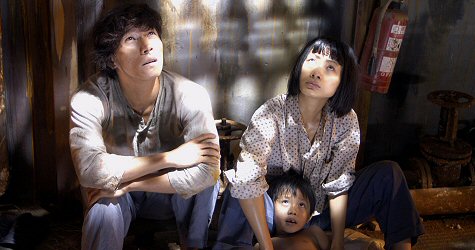
Damien Nguyen, Thi Kim Xuan Chau, Bai Ling aboard freighter in Hans Petter Moland’s The Beautiful Country.
And that was pretty much it for me until last Monday night, when I saw Hans Petter Moland’s The Beautiful Country (Sony Pictures Classics, 7.8) and just about flipped.
It won’t open for another two and a half months, which is plenty of time for people to read this article and then forget about it, but this 125 minute Norwegian-made, mostly English-speaking film is, by my sights, a nearly great thing. And it’s come out of nowhere, in a sense. And it needs all the advance word it can get.
< ?php include ('/home/hollyw9/public_html/wired'); ?>
A road (and sea) movie in the most profound sense of that term, and a story about the resilience of the human spirit (although I have mixed feelings about describing it this way, given how totally full-of-shit that last proclamation sounds), The Beautiful Country is a movie about restraint, restraint and more restraint…and eventually, huge payoffs.
Especially during the last 20 minutes or so, when the great Nick Nolte arrives.
Set in 1990, The Beautiful Country is about a mixed-race, half-American young Vietnamese guy named Binh (Damien Nguyen) whom we first meet in a rural Vietnamese village working as a handy man, and dealing with racist disdain for being the son of an American G.I., and generally wondering who he is and where he belongs.
The movie follows Binh to Saigon (Ho Chi Minh City) to find his long-lost mother. He lives and works with her for a spell, and then something bad happens and he drifts off to sea with some boat people with his mother’s young son in tow.
They land in a Malaysian refugee camp, where Binh meets and falls in love with the beautiful Ling (Bai Ling). He and Ling and the boy eventually climb aboard a rusty freighter, which is captained by a cold-hearted prick (Tim Roth), that’s transporting illegals to the U.S.
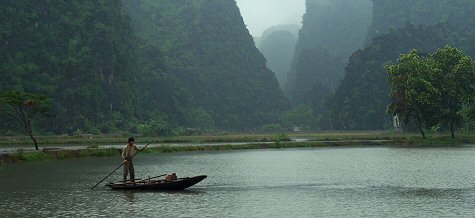
And then it’s into his life in New York City as an indentured slave worker in a Chinatown restaurant, and finally a trip to Texas where he eventually finds his dad, who turns out to be Nolte.
The 64 year-old Nolte gives one of best-ever performances, and if you ask me is a probable candidate for a Best Supporting Actor nomination eight or nine months from now.
I could feel The Beautiful Country taking hold and feeling like the real deal almost immediately. You can say it’s not 100% perfect (maybe a tad cliched here and there, but only a little bit), and that it’s just another variation on a Terrence Malick-styled young-people-on-the-run movie. (Malick thought up the basic story idea and co-produced the film with Badlands producer Edward Pressman).
But it felt to me (and I can be a soft touch at times) like some kind of masterwork…one of the most profound and compassionate and finely nuanced films about the rough-and-tumble, never-say-die life of a roaming, disenfranchised person I’ve ever seen.
It’s also a great Vietnam healing movie for American audiences. I don’t know how to put it exactly, but this film feels like it’s in touch with feelings about the Vietnam War that should have come to the surface a long time ago. It’s a movie that says to American vets and Vietnamese nationals, “Uhm, guys? You need to talk.” It seems to be mining the emotional aftermath of this 40 year-old conflict on a level that’s never really been sorted out before. And without raising this or that issue or memory or specific incident. It all just kind of seeps in.
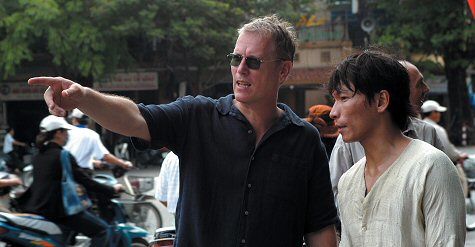
Beautiful Country director Hans Petter Molan with star Damien Nguyen.
It’s also a great and sometimes very sad movie about parenting. And it ends with a father-son moment that really touches bottom. And it manages to make the title of the film echo back in a way that feels different and thoughtful.
The irony is that The Beautiful Country was half-written off, or at least put on hold in the minds of potential distributors, after it was shown at the Berlin Film Festival in February 2004. It ran 136 minutes, and everyone (or a good percentage of those who were there) thought it was too long.
It took Moland, Malick and Pressman several months to prune it down to 125 minutes, partly over creative disagreements, and partly, I’ve been told, due to post-production coin being a little short. It played at Karlovy Vary last summer, but the trimmed version, I’ve heard, wasn’t completed in time to make the deadline for last September’s Telluride and Toronto and New York Film Festivals. And it didn’t play Sundance.
But the guys at Sony Pictures Classics saw through all this and now it’s slated as a mid-summer counter-programmer.
The people who mainly go to dumb-shit movies and don’t want to know or feel anything new or exotic will probably figure out ways of ducking The Beautiful Country, and maybe not even seeing it on DVD. It’s their loss and what can you do?
I didn’t know Moland at all before this, but he knows exactly what he’s doing here. I’m told I should see a mother-daughter relationship film he directed in 2000 called Abderdeen.
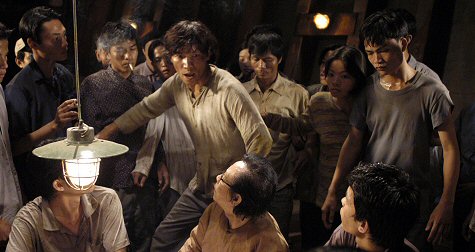
The Beautiful Country screenplay is by Sabina Murray and Larry Gross, working from a “story” by Lingard Jervey and an idea by Malick.
I said earlier that Roth’s character is a prick, and he is, but it’s part of this film’s delicate calibrations that he’s not painted too broadly and has other colors to show. There’s an American businessman who takes an interest in Ling in the New York section who could have been portrayed as a crass vulgar sort, but he, too, comes through with a certain humanity. Ditto the middle-aged woman who plays Nolte’s angry ex-wife.
There are one or two exceptions, but just about everyone in this movie has some kind of unexpected (by the cut-and-dried standards of too many films these days) dimension.
Stuart Dryburgh’s widescreen photography reminded me at times of the work of Chris Doyle (the dp for all those Wong Kar Wai films as well as Phillip Noyce’s The Quiet American ), which came as something of a surprise. Dryburgh is a respected veteran and all, but his recent credits (Aeon Flux, Bridget Jones’ Diary, Runaway Bride, Analyze This) don’t exactly say “art film cinematographer.”
I disagree with those who’ve said that Nguyen’s performance, which is all about being quiet and saying very little and frequently cowering, is some kind of liability. I believed in his character completely, and didn’t detect a single false note. I actually found him charismatic in a tentative, meditative, internalized way.
Bai Ling, a fairly well-known Asian actress who’s been working in Hollywood for about ten years (Red Corner, Anna and the King, Star Wars, Episode 3: Revenge of the Sith), seems out of place in the Malaysian refugee camp…at first.
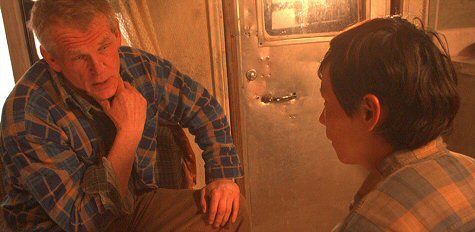
Nick Nolte, Damien Nguyen.
She seems too shrewd and attractive to be from the bottom rung, or to have landed in such dire straits. But I bought into this because she delivers a convincingly cynical (bordering on bitter) attitude, and because I wanted her character to hook up with Binh.
Some critics (I can almost predict which ones) won’t fall for this film like I have, and that’s fine. But I can’t imagine anyone not being wowed by Nolte, who gathers that whole grizzled-older-guy thing that he’s been developing over the past 10 years or so and knocks it out of the park.
The title, according to Derek Elley’s Variety review, refers to the Chinese name for America — “mei guo” — which literally means “beautiful country.” But this is a film about beauty in all corners of the world, and in all sorts of unexpected places.












